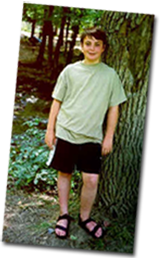
Sean and the Raccoon
When Sean was 11 years old, he was camping with his class at the Okefenokee National Wildlife Refuge in Georgia. While there, he was bitten by a raccoon.
"I was on a camping trip with my 5th grade class. In the middle of the night, I felt a sharp pain in my arm. I looked down and saw two bite marks and some blood. I heard a rustle like something was going out of the tent and saw a raccoon. I sat up and called for my teacher. We cleaned out the bite with soap, hot water, and a disinfectant."
"In the morning we went to the hospital in Homerville, Georgia. The pharmacist there gave me 2 shots of immune globulin, one near the bite and the other one a little further away, and a shot of rabies vaccine. These shots help your body make powerful antibodies to help fight the rabies virus."
"I had to wait one hour to be sure I didn´t have an allergic reaction to anything. When I got home, I had to get four more shots spaced out during the next month. Lots of people told me that I was really lucky because ten years ago I would have had to get 26 shots in the stomach if someone thought I might have been bitten by an animal with rabies."
"My advice? If you have the shots, don´t tense up. Just relax, because then it hurts a whole lot less. And if you´re around wild animals, don´t mess with them. And don´t feed them because later they may come back for more food. You never know if a wild animal, even a cute baby raccoon, may have rabies."
Sean was lucky because today we have a vaccine for rabies that works and is pretty painless. Back before we had a vaccine, if someone was bitten by an animal that might have rabies, there wasn´t anything that could be done except to clean the wound and wait to see what happened. If they developed rabies, they would die.


